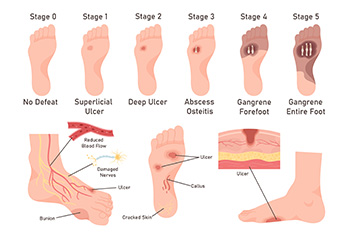3320 North Buffalo Drive
Suite 107
Las Vegas, NV 89129

Diabetic foot ulcers, or DFUs, are open sores that often develop in the ball of the foot, heel, or tips of the toes. Diabetic foot ulcers result from nerve damage and poor circulation caused by prolonged high blood sugar levels, which impair sensation and slow healing. Without proper care, DFUs can lead to serious infections, gangrene, or limb loss. The Wagner classification system is commonly used to assess the severity of DFUs. It includes six grades: Grade 0 indicates no open lesions but a high-risk foot. Grade 1 refers to superficial ulcers. Grade 2 involves deeper ulcers that extend to ligaments or muscles. Grade 3 signifies ulcers with bone involvement or abscess. Grade 4 describes localized gangrene of the forefoot. Grade 5 represents extensive gangrene of the entire foot. These stages help a podiatrist determine the best course of treatment, including wound care and infection management, to prevent further complications. If you have developed a foot ulcer related to diabetes, it is suggested that you make an appointment with a podiatrist for regular exams and necessary treatment.
Diabetic foot care is important in preventing foot ailments such as ulcers. If you are suffering from diabetes or have any other concerns about your feet, contact one of our podiatrists from Summerlin Foot & Ankle. Our doctors can provide the care you need to keep you pain-free and on your feet.
Diabetic Foot Care
Diabetes affects millions of people every year. The condition can damage blood vessels in many parts of the body, especially the feet. Because of this, taking care of your feet is essential if you have diabetes, and having a podiatrist help monitor your foot health is highly recommended.
The Importance of Caring for Your Feet
Patients with diabetes should have their doctor monitor their blood levels, as blood sugar levels play such a huge role in diabetic care. Monitoring these levels on a regular basis is highly advised.
It is always best to inform your healthcare professional of any concerns you may have regarding your feet, especially for diabetic patients. Early treatment and routine foot examinations are keys to maintaining proper health, especially because severe complications can arise if proper treatment is not applied.
If you have any questions please feel free to contact our office located in Las Vegas, NV . We offer the newest diagnostic and treatment technologies for all your foot and ankle needs.

Swollen feet can be caused by several factors, often linked to underlying health conditions. One common cause is leaky veins, where blood flows backward due to weakened valves, leading to fluid buildup in the lower limbs. This condition, known as venous insufficiency, is often accompanied by discomfort and swelling. Another factor to consider is the side effects of medication. Certain drugs, such as those used for high blood pressure or diabetes, can cause fluid retention, leading to swelling in the feet. Dependent edema is another possible cause, particularly for individuals who spend prolonged periods standing or sitting. This condition results from gravity pulling fluid into the lower extremities. Lastly, inflammation due to injury, infection, or conditions like arthritis can cause swelling in the feet. If you have swollen feet, it is suggested that you consult a podiatrist who can determine what the reason is, and offer effective relief and treatment tips.
Swollen feet can be a sign of an underlying condition. If you have any concerns, contact one of our podiatrists of Summerlin Foot & Ankle. Our doctors can provide the care you need to keep you pain-free and on your feet.
Swollen feet are a common ailment among pregnant women and people who stand or sit for extended periods. Aging may increase the possibility of swollen feet and patients who are obese often notice when their feet are swelling too. There may be medical reasons why swollen feet occur:
Swollen feet can also be caused by bone and tendon conditions, including fractures, arthritis, and tendinitis. Additionally, there may be skin and toenail conditions and an infection may cause the feet to swell. Patients who take medicine to treat high blood pressure may be prone to getting swollen feet.
Many patients elevate their feet to help relieve the swelling and this is generally a temporary remedy. When a podiatrist is consulted the reason behind the swelling can be uncovered and subsequently treated.
If you have any questions please feel free to contact our office located in Las Vegas, NV . We offer the newest diagnostic tools and technology to treat your foot and ankle needs.

Nerve pain on the top of the foot is often caused by pressure or irritation from tight shoes or laces. This pressure can compress nerves, leading to pain, numbness, or tingling that may spread to the toes. Activities that involve repetitive movement, such as running or dancing, can worsen the problem, especially when combined with foot mechanics or wearing improper footwear. Bony growths or inflammation can also contribute to nerve pain on top of the foot, also referred to as vamp disease, by pressing against nearby tissues. A podiatrist can identify the root cause of this discomfort through a detailed examination and imaging, if needed. Treatments focus on relieving pressure on the nerves, which may include changes in footwear or adjustments to how shoes are laced. For more persistent cases, it is suggested that you contact a podiatrist who may recommend surgery to remove bony growths or reduce nerve compression.
Neuropathy
Neuropathy can be a potentially serious condition, especially if it is left undiagnosed. If you have any concerns that you may be experiencing nerve loss in your feet, consult with one of our podiatrists from Summerlin Foot & Ankle. Our doctors will assess your condition and provide you with quality foot and ankle treatment for neuropathy.
What Is Neuropathy?
Neuropathy is a condition that leads to damage to the nerves in the body. Peripheral neuropathy, or neuropathy that affects your peripheral nervous system, usually occurs in the feet. Neuropathy can be triggered by a number of different causes. Such causes include diabetes, infections, cancers, disorders, and toxic substances.
Symptoms of Neuropathy Include:
Those with diabetes are at serious risk due to being unable to feel an ulcer on their feet. Diabetics usually also suffer from poor blood circulation. This can lead to the wound not healing, infections occurring, and the limb may have to be amputated.
Treatment
To treat neuropathy in the foot, podiatrists will first diagnose the cause of the neuropathy. Figuring out the underlying cause of the neuropathy will allow the podiatrist to prescribe the best treatment, whether it be caused by diabetes, toxic substance exposure, infection, etc. If the nerve has not died, then it’s possible that sensation may be able to return to the foot.
Pain medication may be issued for pain. Electrical nerve stimulation can be used to stimulate nerves. If the neuropathy is caused from pressure on the nerves, then surgery may be necessary.
If you have any questions, please feel free to contact our office located in Las Vegas, NV . We offer the newest diagnostic and treatment technologies for all your foot care needs.

Plantar fasciitis is a painful foot condition that affects millions of people in the United States. It occurs when the plantar fascia, a thick band of tissue running along the bottom of the foot, becomes inflamed. This inflammation often leads to sharp heel pain, particularly when taking the first steps in the morning or after periods of rest. Other symptoms include swelling and tenderness along the arch or heel. The primary causes of plantar fasciitis include overuse, excessive weight, wearing poor footwear, or certain foot structures, such as flat feet or high arches. Activities that involve prolonged standing, running, or jumping can also contribute to the condition. A podiatrist can diagnose plantar fasciitis through physical examination and imaging, if necessary. Treatment options include stretching exercises, custom orthotics, corticosteroid injections, or in severe cases, surgical intervention. If you are dealing with this issue, it is suggested that you schedule an appointment with a podiatrist.
Plantar fasciitis can be very painful and inconvenient. If you are experiencing heel pain or symptoms of plantar fasciitis, contact one of our podiatrists from Summerlin Foot & Ankle. Our doctors can provide the care you need to keep you pain-free and on your feet.
What Is Plantar Fasciitis?
Plantar fasciitis is the inflammation of the thick band of tissue that runs along the bottom of your foot, known as the plantar fascia, and causes mild to severe heel pain.
What Causes Plantar Fasciitis?
How Can It Be Treated?
While very treatable, plantar fasciitis is definitely not something that should be ignored. Especially in severe cases, speaking to your doctor right away is highly recommended to avoid complications and severe heel pain. Your podiatrist can work with you to provide the appropriate treatment options tailored to your condition.
If you have any questions please feel free to contact our office located in Las Vegas, NV . We offer the newest diagnostic and treatment technologies for all your foot and ankle needs.